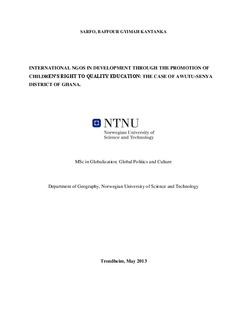International NGOs in development through the promotion of children's right to quality education: The case of Awutu-Senya District of Ghana
Master thesis
Permanent lenke
http://hdl.handle.net/11250/265573Utgivelsesdato
2013Metadata
Vis full innførselSamlinger
- Institutt for geografi [1023]
Sammendrag
Non-governmental organizations (NGOs) in recent times have become prominent in the developmental agenda of most deprived societies across the globe. Through the adoption of rights and participatory mechanisms in their development work, NGOs are able to help state authorities to facilitate their development policies. In their quest to reduce poverty and inequality, NGOs initiate and implement certain projects in specific areas within various deprived communities. One such area is the promotion of children’s right to quality education through the execution of educational projects. This study therefore identifies and critically examines the impacts of Plan International’s educational projects on children’s rights to quality education in the Awutu-Senya District of Ghana. Qualitative research methodology was used for data collection and analysis. Both the semi-structured interviews and focus group discussions were used to get the perspectives of officials of the NGO and 23 members of the beneficiary communities which included children, their parents and teachers. The theoretical framework used for this study was the alternative development theory with specific emphasis on the rights-based approach to development. The general findings of this study suggested that most of the children in the NGOs assisted communities have witnessed improvements in the quality of their educational system, especially in the area of learning environment and service delivery. The children are now being provided with the necessary skills and tools to make them productive and facilitate the socio-economic development of their community. However, few problems bothering on over-expectations on the NGO, inadequate funds for scholarships, apathy on the part of some members of the beneficiary communities and the inability of local government to fulfill their obligations were recorded in the course of this study.
